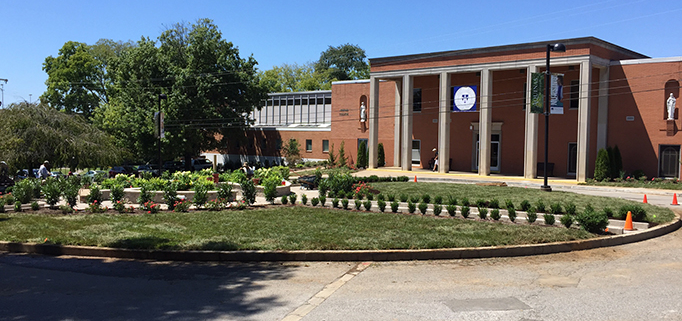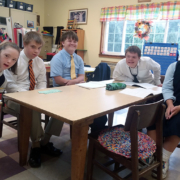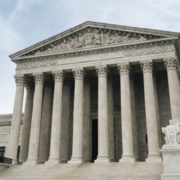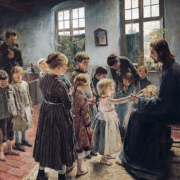Nashville Dominicans Turn Focus Entirely to Teacher Formation
A few years ago, Sister Mary Sarah Galbraith, OP, and her team at Nashville’s Aquinas College set out to build a four-year, traditional college by expanding disciplines beyond nursing and education and building a residential campus.
In many respects, they found significant success, and their accomplishments suggest real opportunities for colleges that strongly embrace their Catholic identity.
Now the college has a new vision — still firmly Catholic and promising the bear much fruit for the Church and the New Evangelization. Today the college’s owners, the Dominican Sisters of St. Cecilia, announced a bold new direction that focuses entirely on teacher education and Catholic schools initiatives, while retaining courses in theology and philosophy.
The shift was made partly because of financial concerns, although the college remains strong relative to many other small colleges.
I spoke to Sister Anne Catherine Burleigh, OP, spokeswoman for the Dominican Sisters of St. Cecilia, about the changes and what they mean for Aquinas College.
Centered on Catholic education
Teacher formation is a natural emphasis for the Nashville congregation, which has taught in Catholic schools since prior to the Civil War. Whereas most women’s religious orders have pulled out of Catholic schools and dwindled in number, the Dominican Sisters of St. Cecilia have expanded into 49 schools in 28 dioceses. They are located in the U.S., Canada, Ireland, Scotland, Italy, the Netherlands and Australia.
In 2013, Bishop Hugh Gilbert of Aberdeen, Scotland, was so enthusiastic in welcoming the largely American sisters to his diocese, he described them as heroes rescuing Catholic schools and Catholic culture.
“I’m old enough to remember Westerns,” Bishop Gilbert said. “And here we are, wagons drawn close, feeling our last days have come and our scalps about to be removed, when — lo and behold — the U.S. 7th Cavalry appears over the hill. Here they are, armed not with carbines but rosaries. And we can breathe again.”
The Congregation of St. Cecilia has grown by more than two thirds since 2000. About 250 of the 300 sisters are active in various apostolates, and the average age of the Sisters is 39.
“God is great,” Sr. Anne Catherine says regarding the 16 to 20 postulants the congregation sees annually.
Aquinas College, fully owned by the congregation, has been a hub for the congregation’s training for both the Sisters and lay Catholic teachers. The college is distinguished by its strong commitment to fidelity and to preparing teachers primarily for Catholic schools.
“The approach to teacher education at Aquinas College is based on the conviction that teaching is more than a career choice,” explains Sr. Mary Sarah in a press release about the reconfiguration. “It is both a gift and a mission.”
In addition to teacher formation, the college will continue its very successful initiatives in education and evangelization. The Center for Catholic Education provides spiritual and professional formation for educators and parents beyond the college, and its annual WISE Conference for Catholic School Educators provides a much-needed emphasis on Catholic identity and mission.
The college’s work in Catholic education “is more needed than ever,” says Sr. Anne Catherine. “It’s something that we do well, and we want to continue to do it well.”
Position of strength
Of course, the dramatic changes bring a lot of pain to this small, close-knit community, which learned today that about 60 faculty members and staff will lose their jobs.
More than half the college’s 257 students also must complete their degrees elsewhere. After this semester, Aquinas College will no longer offer degrees in the arts and sciences, business and nursing. The latter was once a mainstay of the college, but it had already phased out the its two-year associates program in nursing to attract more four-year, full-time students.
In keeping with the Sisters’ deep commitment to the good of their students, Sr. Mary Sarah and the college’s other leaders have worked hard to help students make the most of the situation. Fourteen colleges—including local colleges and some of the faithful Catholic colleges in The Newman Guide—have been lined up to accept Aquinas students with comparable tuition and financial aid.
Still, this was an emotional morning for students and employees learning about the new direction for the first time. College leaders were scheduled to meet with faculty and staff at 9:00 a.m., and students soon afterward. The public learned the news before lunchtime.
Did finances have anything to do with the decision? The Sisters acknowledge that Aquinas was under the same severe difficulties that most small colleges face today, competing with state-funded universities and large institutions with big endowments to support financial aid. Aquinas has just $5 million in endowment funds.
Still, it doesn’t seem that the college’s situation is dire. According to the U.S. Education Department’s financial health ratings released just this week, there are many colleges in much worse straits than Aquinas.
Sr. Anne Catherine explains that by making changes now and avoiding debt, the Sisters can be “proactive” and move the college forward “from a position of strength.” The Sisters’ principled refusal to take on heavy debt is unique among small colleges today — especially those that are rapidly expanding their campuses, as Aquinas planned to do before changing direction today. It had just built a new women’s dorm, completed in 2015.
Acknowledging the pain of displaced students and employees, Sr. Anne Catherine said that the careful financial strategy reflects the Sisters’ commitment to “do what is right and good” for the college community while protecting the college and congregation from “serious financial risk.” For now, the Sisters have concluded that abandoning the vision of a four-year traditional college with residential options and student activities is the prudent path forward.
A model for success
While the Sisters have found the changes financially necessary and have centered on their mission of serving Catholic schools, it shouldn’t be ignored what Aquinas College accomplished in recent years toward its prior goal of building a traditional college with multiple disciplines.
In just a few years, Sister Mary Sarah and the college leadership added new four-year bachelor’s level programs, expanded campus residences and student activities, and attracted faculty like Joseph Pearce, the acclaimed literary expert who has led the college’s Center for Faith and Culture. The acclaimed teacher formation program, which remains, has been valuable to bishops and educators around the U.S. and the globe.
In all of this, Aquinas proudly advertised that “we take our Catholic and Dominican identity seriously.” From renovating chapels to hiring faithful faculty, the college put its commitment into action. And the college’s leaders say that fidelity to Catholic teaching was never a detriment to attracting students and support, but in fact was a key strength.
Paul Downey, director of marketing and communications, told me a few weeks ago, “We think Aquinas is a great case study in how strong Catholic identity isn’t just a good idea from a moral standpoint. It also makes for a stronger institution.”
He said that from fall 2011 to fall 2016 — in just five years — the college posted these impressive results:
- the portion of students who were Catholic increased from 35 percent to 63 percent, despite the college’s location in an area with only 6 percent Catholic residents;
- the portion of students from out of state increased from 8 percent of first-time freshmen to 67 percent;
- the portion of undergraduates who were full-time students increased from 32 percent of undergraduates to 69 percent; and
- new students interested in non-nursing programs increased from 27 percent to 47 percent.
That’s the sort of growth that would make any faithful Catholic college envious!
It may seem contradictory to focus on these accomplishments, on a day when Aquinas College has narrowed its emphasis to teacher formation and thereby eliminated its non-education programs and its plan to expand residences. But the marked accomplishments that I highlighted don’t fully address the financial realities that the Dominicans and all small colleges face today.
What the accomplishments do demonstrate is that it would be very wrong to assume that the college substantially failed in its efforts in recent years—especially the marketing of the college’s strong Catholic identity. In many respects, the college’s Catholic identity was what allowed it to attract students and faculty, and strong Catholic identity will continue to be key to the college’s success in the future.
I hope that other Catholic college leaders learn from Aquinas College’s steadfast commitment to its Catholic mission, to its sponsoring order’s charism, and to financial prudence.
May God bless the Sisters in their very important and urgently needed work of preparing teachers for faithful Catholic education worldwide. I have no doubt that their fortitude and trust in God will carry them through this next journey.
This article first appeared at The National Catholic Register.




 Photo by David Mark via Pixabay CC0
Photo by David Mark via Pixabay CC0

